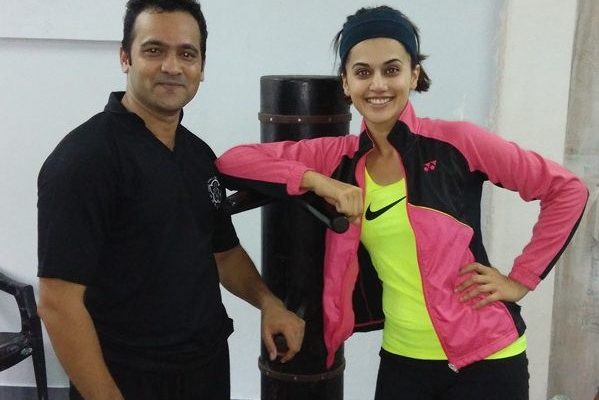Nilesh Prabhulkar, a Mumbai based Social Entrepreneur, Martial Arts trainer, and Consultant passionately supports the No Sir No Madam culture. Nilesh has an MBA degree in marketing and 15 years of work experience with well-known brands such as Tata Docomo, Meru Cabs, and Samsonite & Camlin Kokuyo. Nilesh has been a part of the fast-moving consumer goods (FMCG) and Service industry, performing multiple functions in quality service excellence, product management, and brand management.
As social entrepreneur, martial artist, and corporate trainer, he is spreading the philosophy of martial arts to achieve success in both personal and professional lives. Along with leadership workshops, he also provides self-protection training to women through his NGO “Swarakshan Trust.” While on one hand Nilesh is the Principal instructor at India Wing Chun Academy and has been a celebrity trainer for both Bollywood and Hollywood stars. On the other hand his NGO also trains Self Protection skills to women from NGOs like YWCA, Priyadarshini Taxi
Nilesh asserts that there is a strong need to reduce team interactions through hierarchical processes. We can achieve this by removing the custom of salutation, which simply creates road blocks. Nilesh believes that one should earn respect by consistent, responsible, and illustrative actions. The teams will then gain more agility to reach the desired goal.
Nilesh mentions that in his academy, they organically follow the No Sir No Madam terminology. There has been a complete paradigm shift from traditional martial arts to modern martial arts. They have categorically asked the students to regard the teachers by their names and not to touch their feet. Hence, there is no need for adulation and hero worship.
As they have removed ritualistic practices from the training procedure in the academy, the students are more comfortable around the teachers. Nilesh states, “At times in certain martial art movies we often see when questioned by students, masters punish them in several ways.” He does not entertain such traditional training methods as it hindered growth and learning.
Nilesh infers that the leaders should spread the idea of mutual respect among the mass. His organization works with people of different age groups and stratums. The process also teaches the trainers to be more humble and understanding. Nilesh’s assets “The objective is to empower all sections. The help are not slaves hence, deserve the same respect.”
Nilesh observes that it is necessary to transform the system from authoritarian leadership to modern collaborative leadership. The terms Sir or Madam will then be irrelevant in relation to power dynamics. Students need to learn taught the modern and liberal ways of progress rather than the ladder structure. Nilesh has a collaborative team where every trainer handles a crucial area of work so that power is not concentrated in one hand.
We can reach solutions and conclusions only when we comfortably address the problem. Nilesh enumerates, “’When parents scold children constantly, they will not share their problems with. Hence, a friendly environment needs to be created for healthy discussion.” Thus, every member in the academy is accessible, and they adapt to the students’ requirement. However, he also indicates that this informal structure does not give one the liberty to cross the line.
Nilesh considers every opinion to be crucial for a collective management. In the modern age, singular decision-making might be regressive in nature. He believes in allocating work based on skills and not designation. Nilesh never shies away from stepping back and giving responsibilities to more experienced people in the time of need.
Nilesh recognizes the effort made by the No Sir No Madam cause to strike on the fundamental issue of adapting to the predetermined tradition. It has been thought-provoking and made him look back on his work. Enforcing rules or ideas on people may not have a positive long-term effect in the end. Rather, every individual needs to be made aware so that they can implement a change.
In conclusion, Nilesh proposes that there is a need for a change in mindsets of the citizens. People should follow their passions and break hierarchies. He observes, “I cannot control the world, but I can control my interactions with the world which can create an example.” Therefore, every Indian is responsible as the nation can only develop through collective effort.







Add comment